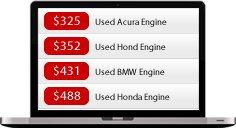Dodge D50 Engine
Please complete the following fields to receive bids from vendors with a Dodge D50 Engine for sale!
In 1979, an international partnership between Dodge and Mitsubishi resulted in the creation of the Dodge Ram 50. The Ram D50, later called the Ram 50, was produced to acquire market share in the compact pickup race of which began largely due to the OPEC gas crisis of the 1970s.
Four Engines
Initially, the D50 began with two engine types–the 2.0L (122 cid) 4G52 I4 and the 2.6L (156 cid) G54B I4. Both incorporated Mitsubishi’s patented Silent Shaft to offset the inherent vibration common to the asymmetrical design of all straight-four engines. The Silent Shaft is located on the low side of the I4 and powered by the oil pump with a timing chain. Interestingly, Mitsubishi’s Silent Shaft was licensed to Porsche, Fiat and Saab. The 2.0L 4G52 I4 was replaced in 1983 by the 2.0L G63B I4 which added a carburetor.
By 1983, Dodge introduced the 2.4L Turbo-diesel(144 cid) 4D55T I4 which boasted a turbocharger to improve power output, lower emissions, and improve engine efficiency. However, the increased retail price tag, higher maintenance costs, and sluggish performance in colder areas was not received well by consumers. Subsequently, the engine was discontinued three years later in 1986.
New Names, Same Engines
Nissan, Chevy, Toyota, and Ford had all made inroads to the success of the D50. Therefore, the name was dropped, and two new model names were introduced in 1987–the Ram and the Mighty Max. The new models offered extended cabs but used the same I4 engines of the original D50.
Three years later Dodge decided to use two new engines to revitalize slumping sales of the Ram 50 and Mighty Max. The standard engine became the 2.4L 116hp 4G64 I4 while a 3.0L 142hp 6G72 V6 was offered as an optional choice to consumers. The new changes were not enough to win the public’s affections. Reoccurring problems with the EGR valve and Vacuum control solenoid in the 2.4L engine reduced customer satisfaction.
Engine Overview by Years
1979–1982 2.0L [4G52] I4, SOHC, 90-93 hp (67-69 kW)
1983–1989 2.0L [G63B] I4, Carbureted SOHC, 90-93 hp (67-69 kW)
1979–1989 2.6L [G54B] (4G54) I4, SOHC, 105 hp (78 kW)
1983–1985 2.3L [4D55T] turbo diesel I4, 80-86 hp (61-64 kW)
1990–1996 2.4L [4G64] I4, 116 hp (87 kW)
1990–1996 3.0L [6G72] V6, 142 hp (106 kW)



